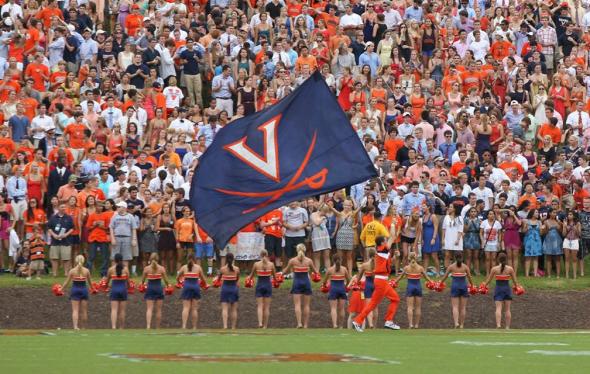A searing story in the latest issue of Rolling Stone takes on the issue of sexual assault on American college campuses—using the University of Virginia as an unfortunate case study. It’s a disturbing read. The story recounts a gruesome gang rape of a young woman at a UVA frat house, a campus culture where individuals overlook sexual crimes in order to maintain frathouse-based social standing, and the university administration’s profound indifference to incidents of sexual assault on campus. Days after the story was published, Rolling Stone followed up with even more accounts of rape and sexual assault at UVA.
The university has been on the defensive since the story broke. On Saturday, UVA President Teresa Sullivan suspended fraternities at the university until next semester. “Beginning immediately, I am suspending all fraternal organizations and associated social activities until January 9th, ahead of the beginning of our spring semester,” Sullivan wrote in a statement on Saturday. “In the intervening period we will assemble groups of students, faculty, alumni, and other concerned parties to discuss our next steps in preventing sexual assault and sexual violence on Grounds.”
The accusations are serious. Here’s an excerpt from Rolling Stone:
UVA isn’t an edgy or progressive campus by any stretch. The pinnacle of its polite activism is its annual Take Back the Night vigil, which on this campus of 21,000 students attracts an audience of less than 500 souls. But the dearth of attention isn’t because rape doesn’t happen in Charlottesville. It’s because at UVA, rapes are kept quiet, both by students—who brush off sexual assaults as regrettable but inevitable casualties of their cherished party culture—and by an administration that critics say is less concerned with protecting students than it is with protecting its own reputation from scandal. Some UVA women, so sickened by the university’s culture of hidden sexual violence, have taken to calling it “UVrApe.” “University of Virginia thinks they’re above the law,” says UVA grad and victims-rights advocate Liz Seccuro. “They go to such lengths to protect themselves. There’s a national conversation about sexual assault, but nothing at UVA is changing.”
In her letter addressing the report, Sullivan invokes the words of Thomas Jefferson as a model of how the university should respond. “Jefferson, as he always does, provides a compelling backdrop: It is more honorable to repair a wrong than to persist in it.” Jefferson was, of course, the third President of the United States and founder of the University of Virginia. But for all of his strengths to aspire to, Jefferson is probably not the most appropriate role model when it comes to sexual conduct, as historians describe Jefferson as having a sexual relationship with a slave, Sally Hemings, when she was as young as 14 years old.
